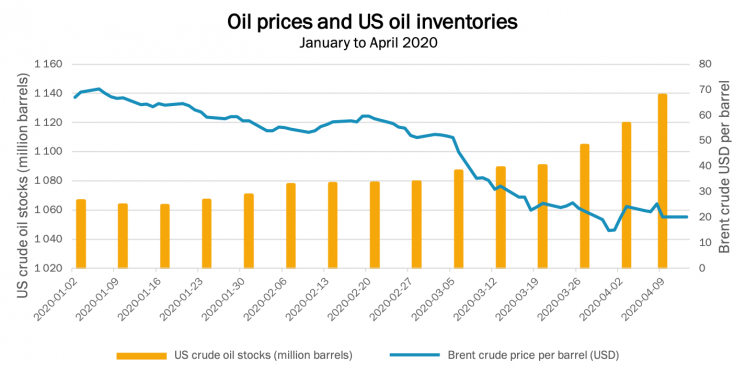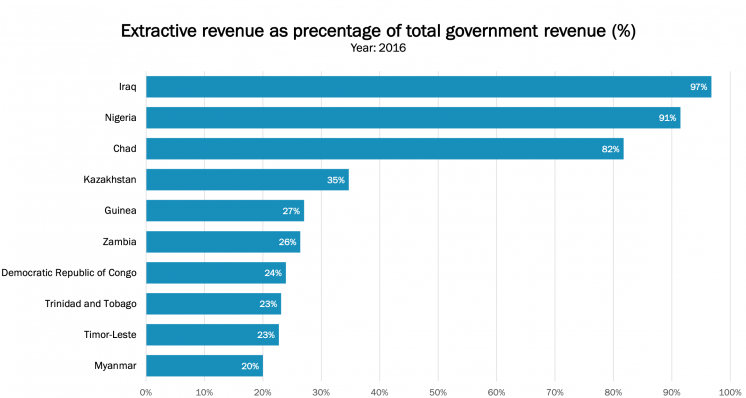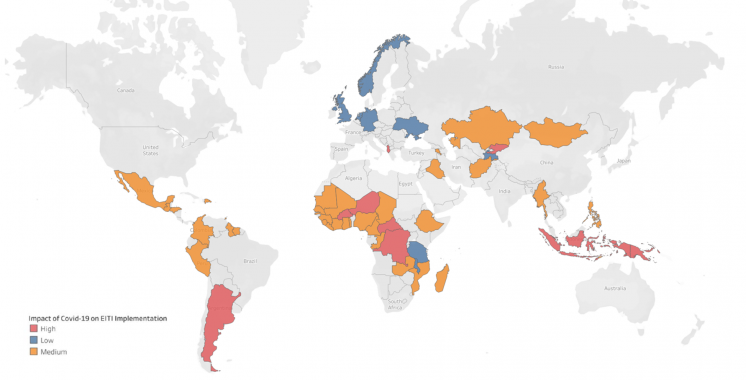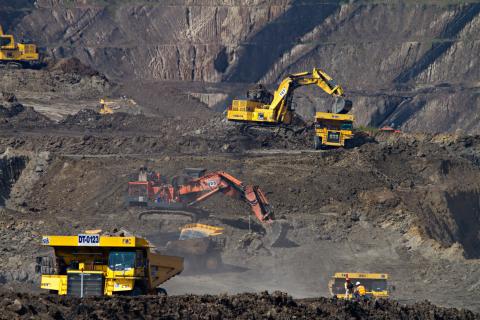
Keeping transparency on track
Keeping EITI implementation on track through and beyond the COVID-19 pandemic
The EITI Standard is widely acknowledged as the benchmark for extractives transparency. Yet, countries seeking to use the EITI to manage natural resource wealth in a transparent and accountable way are facing challenges. Drawing on a survey of the impact of the COVID-19 pandemic on EITI implementation in 53 countries, we examine the threats to resource transparency from the pandemic and offer some ideas on what it will take to keep transparency on track.
It may be premature to draw lessons from the unfolding health and economic crisis, but the critical role of accurate data, transparency and trust in formulating smart and responsive policies is already clear. The same principle applies to building resilient institutions to manage natural resource wealth. Countries implement the EITI to build trust and support the improved management of extractive resources. In the current context, their efforts to ensure greater transparency in the sector are hampered by three factors – a sharp decline in extractive revenues, the difficulty of maintaining a focus on transparency as a policy priority and the transition to virtual working.
Resource revenues under siege
For resource-rich economies seeking to promote responsible and transparent extractive sector production, the first threat to progress emerged at the start of 2020. As Saudi Arabia and Russia embarked on an oil price war that triggered a dramatic fall in prices, analysts predicted a deeper and more protracted downturn in markets. Despite subsequent agreement on production cuts, oil inventories continue to rise. At the time of publication, oil prices fell to unprecedented low levels, prompted by regional shortages in storage.

Source: US Energy Information Administration
By February, the scale of the COVID-19 pandemic started to hit home. Even then, it was difficult to predict the extent to which the pandemic and associated lockdowns would trigger a global economic downturn. An inevitable impact was a sharp fall in the price of many commodities, notably base metals, which closely track economic growth and react strongly to negative growth forecasts.
Between 13 and 23 March, for example, the cash copper price fell by 17% and the aluminium price by 8%. While hopes of a stimulus package in China have spurred some recovery (particularly for copper), the outlook for demand elsewhere is less certain. In economies with large extractives sectors, the temporary closure of operations will further constrain national budgets at a time when most sectors of the economy badly need government support.
More concerning for oil-dependent economies are the long-term price impacts and declines in investment, as the movement of goods and people is reduced and the transition to alternative energy sources accelerates. The significant challenges to the oil industry, which has been resilient in previous price cycles, are unfolding in a changing energy landscape. Projects in Mozambique, Mauritania and Senegal are facing delays. Governments that depend on the resource sector will have to adapt quickly to secure alternative sources of revenue. Developing countries which have not been able to diversify their economies will be disproportionately affected.
Before COVID-19 became a global pandemic, oil and gas producing countries had based revenue forecasts on oil price assumptions in the range of USD 50 to 60 per barrel. At an oil price below the range of USD 20 to 30 per barrel, at least seven countries implementing the EITI could lose a third to half of their extractive revenues. If current market conditions persist, many producers may have to stop producing oil all together, including some which are highly dependent on revenue from the extractive sector.

How Covid-19 may affect EITI implementation
Maintaining a focus on transparency
These are difficult circumstances in which to maintain focus on transparency initiatives. Governments globally are addressing immediate health priorities and prioritising economic recovery. Scarce financial resources and policy attention may easily be diverted from the scrutiny of public spending. Accountability may be reduced as countries deal with the crisis in emergency mode. Timetables for publishing data may be pushed out and delays may go unchallenged.
In the middle of April, IMF Head Kristalina Georgieva warned that accountability and transparency should not take a back seat as governments spend to tackle the health crisis. The extractives sector is already vulnerable to corruption, and resource transparency can ill afford to be deprioritised. If the funding of transparency bodies is further constrained, in combination with the challenges outlined above, we may be creating the conditions for corruption to thrive.
Communities around extractives operations will be among the hardest hit. As well as the loss of jobs, they face a reduction in the allocation of their share of resource revenues from central governments. Some subnational transfers may be cancelled altogether. EITI supporting companies such as Newmont, Rio Tinto and Anglo American have responded by setting up emergency funds and detailing how operations should work with local communities through the crisis. But in many regions, the voices of these communities will go unheard. Low levels of internet penetration constrain their access to information and their ability to voice concerns.
Adapting to a virtual landscape
The EITI supports advocacy and reporting mechanisms to monitor extractives revenues and payments, but its implementation relies on the participation of government, companies and civil societies. Decisions are traditionally taken by consensus, and often by multi-stakeholder groups meeting in person.
Under current circumstances, multi-stakeholder groups have had to adapt to the changing landscape, by deliberating and taking decisions without meeting in person. In many cases, managing this transition has been challenging. Basic internet access is lacking, and fledgling governance structures are not well equipped to function in a virtual capacity.
While many oversight bodies have continued to function, others have been severely affected. In particular, activities involving the communication and dissemination of information on the extractives sector have suffered – activities designed to reach communities most heavily impacted by extractives operations. Decisions that are required to continue data collection and verification have been put on hold in countries where virtual meetings are difficult to organise.
Mapping resource transparency risk by region
Responding to the current situation, we surveyed how these factors affect each of the 53 countries implementing the EITI. We identified at least nine countries where EITI implementation is at high risk, four of which are considered to be fragile states. A further 34 countries are likely to experience at least moderate delays in implementation. During the weeks ahead, we will be working with civil society, supporting countries and companies through the EITI International Board to make resources available to countries hardest hit.

Working now, to restart on strong ground
Much useful data is available to help resource-rich countries navigate a safe passage through these headwinds, both now and as economic activity restarts. Recent analysis by the Natural Resources Governance Institute, for example, highlights risks for state-owned oil companies. A pilot project with Open Oil will seek to support EITI implementing countries by combining verified data from EITI reports with oil price data to make more robust data on revenue forecasts public. The Intergovernmental Forum on Mining, Metals, Minerals and Sustainable Development has generated a comprehensive briefing note on mining tax policy responses to COVID-19.
Analysing data already in the public domain can yield a better understanding of the economic impacts of fluctuating commodity prices, enabling better revenue management and stronger institutional capacity to manage the sector in the face of a crisis. National bodies implementing the EITI have an opportunity to focus reporting on data that is relevant to their current context, such as subnational payments which provide a lifeline for vulnerable communities in many countries.
Building trust can act as an antidote to the conditions created by COVID-19, and open data is more important than ever to navigate the challenges governments are facing. Virtual working may present an opportunity to accelerate the pace at which EITI implementing countries can move towards mainstreaming extractives data, by including disclosure in open and accessible government systems.
To be smart, policy choices also need to be well informed. To keep transparent and accountable governance on track, all stakeholders have a role to play. The current crisis will reshape our world, but there will still be demand for extractives resources to rebuild it. Collective stakeholder approaches such as the EITI are established platforms that can help rebuild trust and promote transparent and accountable government in the aftermath of the current crisis. Investing in them now is an opportunity to increase their resilience and to accelerate progress towards relevant and open data as the norm.



